

How Brexit changed the English language. Recent research has revealed a number of expressions that have entered everyday use since Brexit started.

Terms like “Article 50”, “no deal”, “hard border” may now seem just part of life but they were seldom, if ever, used before Brexit. New and interesting phraseological patterns have also arisen around some of these words. For example, treaty articles didn’t used to get “triggered”. Instead, they were “invoked”. The pandemic is changing the English language. In the late spring, however, and again in July, the dictionary's editors released special updates, citing a need to document the impact of the COVID-19 pandemic on the English language.

Although the editors have documented many coronavirus-related linguistic shifts, some of their observations are surprising. They claim, for example, that the pandemic has produced only one truly new word: the acronym COVID-19. Most of the coronavirus-related changes that the editors have noted have to do with older, more obscure words and phrases being catapulted into common usage, such as reproduction number and social distancing. Fresh call for Oxford dictionaries to change 'sexist' definitions. The leaders of Women’s Aid and the Women’s Equality party are among the signatories to an open letter calling on Oxford University Press to change its dictionaries’ “sexist” definitions of the word “woman”.
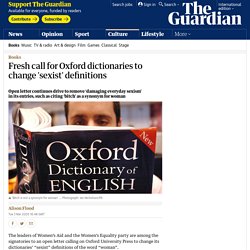
The letter points out that some Oxford Dictionaries’ definitions of the word include synonyms such as “bitch” and “maid”, and says that derogatory and sexist examples of usage include, “God, woman. Will you just listen?” The definitions for “man”, meanwhile, include “a person with the qualities associated with males, such as bravery, spirit, or toughness”. “Bitch is not a synonym for woman. It is dehumanising to call a woman a bitch. The letter, published in time for International Women’s Day on 8 March, is the latest move in a campaign that was launched last year by Maria Beatrice Giovanardi. Malaphors and eggcorns: The art of mangling your words - BBC Ideas. From woke to gammon: buzzwords by the people who coined them. Are we living through a golden age of linguistic inventiveness?
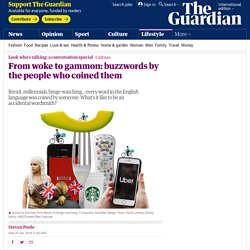
Buzzwords and neologisms – from office jargon to the lexicons of democratic chaos in Britain and the US, as well as the ever-expanding culture wars – rain down on us every day, and can gain global currency at the speed of fibre-optic cable. Many, of course, fail – like “Brixit”, an early rival to Brexit, or “Generation Me”, one proposed label for what we now call millennials. Others rapidly become part of the modern conversation. The baffling and bewildering world of business jargon. Opinion: business buzzwords play with the technical possibilities of English - and often offend against all its rules By Tony Thorne, King's College London On your first day in a new job, when you are told by a colleague to prepare for a "blamestorming session" followed by some "blue-sky thinking", do you rejoice or despair?
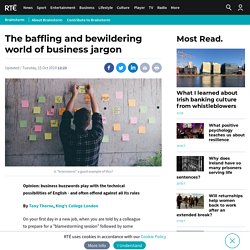
Once settled in, will you nod sagely or succumb to panic on receipt of a memo from the boss reminding you that "even in a gig economy with the right metrics, marketers can prove the effectiveness of digital in delivering brand lift"? There are now many varieties of non-standard English competing for our attention, including slang and messaging abbreviations, regional dialect, advertising slogans and the "journalese" used in headlines by the tabloid press. 'It's a crisis, not a change': the six Guardian language changes on climate matters.
In addition to providing updated guidelines on which images our editors should use to illustrate the climate emergency, we have updated our style guide to introduce terms that more accurately describe the environmental crises facing the world.
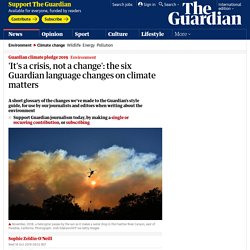
Our editor-in-chief, Katharine Viner, said: “We want to ensure that we are being scientifically precise, while also communicating clearly with readers on this very important issue”. These are the guidelines provided to our journalists and editors to be used in the production of all environment coverage across the Guardian’s website and paper: 1.) “climate emergency” or “climate crisis” to be used instead of “climate change” Cancelled for sadfishing: the top 10 words of 2019. The year 2019 might still have some surprises in store for us – Donald Trump is yet to ask the Queen if she has any dirt on Joe Biden – but we know the general shape of it: global chaos, lies and Love Island.
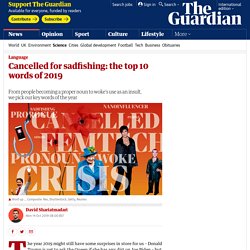
We also know many of its words. We are approaching the moment when the great dictionaries pick those that sum up our times, following on from last year’s “toxic” (Oxford English Dictionary), “justice” (Merriam Webster) “single use” (Collins) and “me too” (Macquarie). The words might not have been coined in 2019, but will have acquired new meaning, risen to prominence, or somehow distil our preoccupations.
In advance of the lexicographers’ big reveal, here are my top 10 candidates. People A pretty ordinary word – and one with a long history (its origins are murky once you get past Latin, where populus meant a community or nation). Nature's language is being hijacked by technology. Image copyright Getty Images "Apple", "tweet", "cloud", "stream" - words that once conjured vivid visions of the countryside are now synonymous with our technological world.
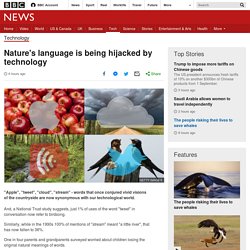
And, a National Trust study suggests, just 1% of uses of the word "tweet" in conversation now refer to birdsong. Similarly, while in the 1990s 100% of mentions of "stream" meant "a little river", that has now fallen to 36%. One in four parents and grandparents surveyed worried about children losing the original natural meanings of words. "A lot of new tech is abstract and difficult to understand, which makes it ripe for metaphor," Dr Robbie Love, a linguistics fellow at the University of Leeds, who conducted the study, told BBC News. And "simple and vivid" words helped to "express something harder to explain". "It makes it easy for people to talk about tech they perhaps don't understand themselves," he said.
Power grab: reclaiming words can be such a bitch. Forty-four.

That’s how many times Madonna uses the word “bitch” on her latest album, Rebel Heart. She has reclaimed and owns it – proudly, powerfully and with panache. It is, perhaps, one of the most successful examples of reclaiming a word that exists in the dubious track record of this linguistically defiant activity. Madonna has a dogged, playful and largely successful way of presenting the subversive to the masses in an easily digestible way. Sometimes, though, it leaves the public with indigestion and they indulge their misogyny and ageism by saying she should “just give it up”, “put it away” and is “past it”. Currently touring Rebel Heart and dropping the B-bomb in her uniquely unmellifluous tones, Ms Ciccone has taken the word and made us sing it back at her – beating us at our own game of ever daring to dislike her. It’s a word that, to an extent, has been adopted as a sisterhood term: “me and my bitches/biatches”.
It hasn’t been fully reclaimed, though. Move over Shakespeare, teen girls are the real language disruptors. Hate vocal fry?

Bothered by the use of “like” and “just”? Think uptalk makes people sound less confident? If so, you may find yourself growing increasingly unpopular—there’s a new wave of people pointing out that criticizing young women’s speech is just old-fashioned sexism. I agree, but I think we can go even further: young women’s speech isn’t just acceptable—it’s revolutionary.
And if we value disruptors and innovation, we shouldn’t just be tolerating young women’s speech—we should be celebrating it. What does it mean to disrupt language? Culture - How Brexit changed the English language. Earlier in March, the British poet Brian Bilston published a new piece on Twitter. Entitled Meaningful Vote, it ends with the lines “How foolish, it seems/How senseless, absurd/To redefine a nation/In pursuit of a word”. Oxford English Dictionary. The decade that time forgot? The 1970s have made little apparent impression on latterday generations, while many of those who actually lived through those orange and brown years seem to wish they hadn’t. Can any of the new vocabulary of that period help to pinpoint the sources of disenchantment? The 70s were certainly not the happiest of times in the workplace: not much call for the smiley face emoticon so associated with the decade there.
It was the decade of strikes and flying pickets (1974), culminating in the UK in the ‘Winter of Discontent’ of 1978-79. Many lost their jobs, and found out all about the newly named job centres (1972; rather less intimidating-sounding than the previous labour exchange) and the giro cheques (1972) with which their benefits were paid. Emoji: The Future of Language? The Meteoric Rise Of The Word "Influencer" By Jane Solomon The word influencer has been used in English since the mid-1600s, though of course back then it wasn’t a job title. In recent years, the term has become a catch-all for a certain kind of career track that is at the center of a burgeoning but profitable industry. As influencer continues to expand in English and pull new terms and meanings into its orbit, it is worthy of charting from a lexical perspective. How social media is changing language. From unfriend to selfie, social media is clearly having an impact on language.
As someone who writes about social media I’m aware of not only how fast these online platforms change, but also of how they influence the language in which I write. The words that surround us every day influence the words we use. Since so much of the written language we see is now on the screens of our computers, tablets, and smartphones, language now evolves partly through our interaction with technology. New Year, New Words. While I may be a prescriptivist (one who believes in following rules) in my approach to grammar and usage, a friend pointed out (correctly) that I stray over into the descriptivist camp (one who accepts the ever-changing nature of language and describes it as currently used) in my approach to new words. I love all words, be they old or new!
Our language reflects our cultural identity as well as our values, so as these change, so do the words we use. While recent overly simplistic slogans such as “you do you,” “it’s a thing,” and “we got you” may elicit nausea, I do (sometimes grudgingly) welcome neologisms. Weekly Word Watch: muggle off, munchkin, and päntsdrunk. We’ve got a hearty serving of words this week, generously topped with mayonnaise, mispronunciations, and M-words. Inside the OED: can the world’s biggest dictionary survive the internet? In February 2009, a Twitter user called @popelizbet issued an apparently historic challenge to someone called Colin: she asked if he could “mansplain” a concept to her.
'Hepeating' is the new word you need to know about since you've probably experienced it. 'Hobbitses' and Frankenstein: how pop culture's words become official. Water cooler conversation at a dictionary company tends towards the odd. A while ago I was chatting with one of my colleagues about our respective defining batches. Academics uncover 30 words 'lost' from English language. Snout-fair, dowsabel and percher are among 30 "lost" words which experts believe are still in current use. ‘Golly’, ‘cassette’ and ‘croquet’: the words we no longer use.
A huge ongoing study by Lancaster University and Cambridge University has discovered what, in fact, we probably knew already: that word-usage changes continuously under the pressures of historical malaise, new sensitivities, the new machineries of life and fashion. Revealed: How Harry Potter has shaped the way we speak. Calling all muggles and mudbloods, dementors and squibs, Harry Potter is 20 this year. Words From 'Harry Potter' Even Muggles Know And Love. Can emoji evolve into a meaningful language? – tech podcast. Allow me to womansplain the problem with gendered language.
Borrowed words in English: tracing the changing patterns. In Borrowed Words: A History of Loanwords in English I examine how words borrowed from different languages have influenced English throughout its history. From Skedaddle to Selfie: Words of the Generations by Allan Metcalf – review. Previously, Allan Metcalf, a professor of English at MacMurray College in Jacksonville, Illinois, has written a whole book devoted to “America’s greatest word”: OK (or “K”, as my 16-year-old daughter likes to “abbrev” it, presumably to save energy in her texting thumb). WMDs, RGPs, DHS: how the Iraq war transformed the English language.
War leaves indelible marks on our language. War of the words: the global conflict that helped shape our language. Grexit, drachmail and eurogeddon - the new eurozone words. Who, What, Why: What is thundersnow? Twitter shows language evolves in cities - tech - 17 November 2012. BBC Radio 4 - Fry's English Delight - Available now. Why and how language changes. The 10 best words the internet has given English. Super Storm Sandy and Candy Crush Have Changed the English Language. 100 words that define the First World War. Texting is “miraculous”: 6 ways we are redefining communication. English language is changing faster than ever, research reveals. Creating New Words For New Needs. Crying with laughter: how we learned how to speak emoji. Do you really know what that word means? What will the English language be like in 100 years? Sexuality: Guide to new world of greysexual, aromantic and questioning.
These 20 words have new meanings. Word Evolution: 11 Words that Mean Something Different to Entrepreneurs Scouring the Web to Make New Words ‘Lookupable’ Category Archive: Word trends and new words. BBC Radio 4 - Word of Mouth, Textspeak. Hashtags and @ symbols affect language on Twitter. English language is changing faster than ever, research reveals.
Where does the word cyber come from? Do you know your sideeye from your subtweets? Take our amazeballs quiz. My Blackberry Is Not Working! - The One Ronnie, Preview - BBC One. The Linguistics of LOL - Britt Peterson. How brand-new words are spreading across America. You Won’t Believe What Word This Column Is About! How emoji became the first truly global language. Erin McKean: The joy of lexicography. Anne Curzan: What makes a word “real”?